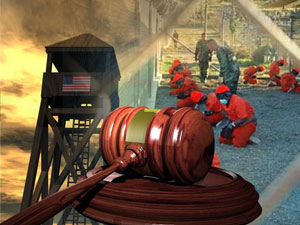NEW YORK (IPS/GIN) – Leading human rights groups reacted with outrage to media reports that the administration of President George W. Bush has decided not to close the prison at the U.S. Naval Base at US-Occupied Guantnamo, Cuba.

Quoting anonymous senior Bush administration officials, the New York Times reported that the issue would in effect be “kicked the down the road” to await action by the new president when he takes office in January.
The Times reported that Mr. Bush never considered proposals drafted by the State Department and the Pentagon that outlined options for transferring the detainees elsewhere.
According the newspaper, Mr. Bush adopted the view of his most hawkish advisers that closing Guantánamo would involve too many legal and political risks to be acceptable, now or any time soon, the officials said.
Civil libertarians were quick to condemn the administration’s position.
Jameel Jaffer, director of the National Security Project for the American Civil Liberties Union Foundation, said, “The decision to keep the prison open is deeply irresponsible. Hundreds of men have been held without charge and without trial for almost seven years.”
“At this point, the government has both a moral and legal obligation to close Guantánamo. Even President Bush has conceded that the prison should be closed. But unfortunately it seems that this administration is simply unwilling to show the leadership that would be required to actually get the job done,” he said Oct. 21.
Mr. Jaffer was also critical of the controversial system of justice that exists at Gitmo. He said, “The handful of prisoners who have been charged with crimes are being tried in a system that is unfair and unconstitutional. It’s a system that allows the government to rely on secret evidence, on hearsay, and on evidence that was elicited through abusive interrogation methods such as waterboarding.”
Jameel Jaffer has been an active participant in cases involving GITMO, the Bush administration’s “domestic surveillance” program, provisions of the USA Patriot Act, and a number of related legal issues.
Shayana Kadidal, an attorney with the Center for Constitutional Rights-a legal advocacy organization that has provided attorneys for many of the Guantánamo detainees–expressed equal outrage.
“We’ve been saying for two years now that the government’s litigation strategy is to run out the clock on these cases and leave the mess at Guantánamo for the next president to clean up–much like the misadventure in Iraq. At every stage the government has tried to maximize delay, with no discernable endgame to resolve the situation,” he said.
Mr. Kadidal said that “various inside sources have told reporters for years that there are no more than two dozen men at Gitmo who might be worthy of facing charges. If the government chooses to charge them they should be charged and tried in federal court inside the United States.”
He predicted that “over 200 of the men still at Guantánamo will be returned to their home countries. The idea that moving prisoners to indefinite detention in Kansas will represent an improvement over Guantánamo is ridiculous.”
Other legal and human rights organizations have also weighed in on the Guantánamo issue. For example, Human Rights First has drafted a report, “How to Close Guantanamo: Blueprint for the Next U.S. Administration,” detailing a step-by-step process for closing Guantánamo and dealing responsibly and legally with the detainees.
Since the United States began sending prisoners from Afghanistan to Guantánamo in January 2002, the island prison has become the center of a highly charged chapter in U.S. jurisprudence.
Related links:
Five Years of My Life: An Innocent Man in Guantanamo by Murat Kurnaz (UK Guardian, 04-23-2008)
Farrakhan calls for delegation to be sent to Guantanamo (FCN, 05-25-2005)
A brief history of the U.S. military occupation of Guantanamo Bay Cuba (HistoryofCuba.com)












